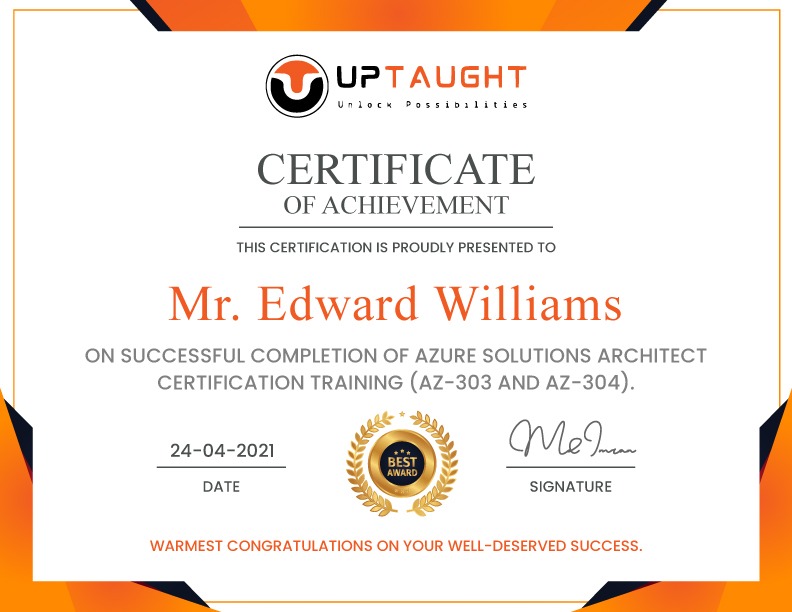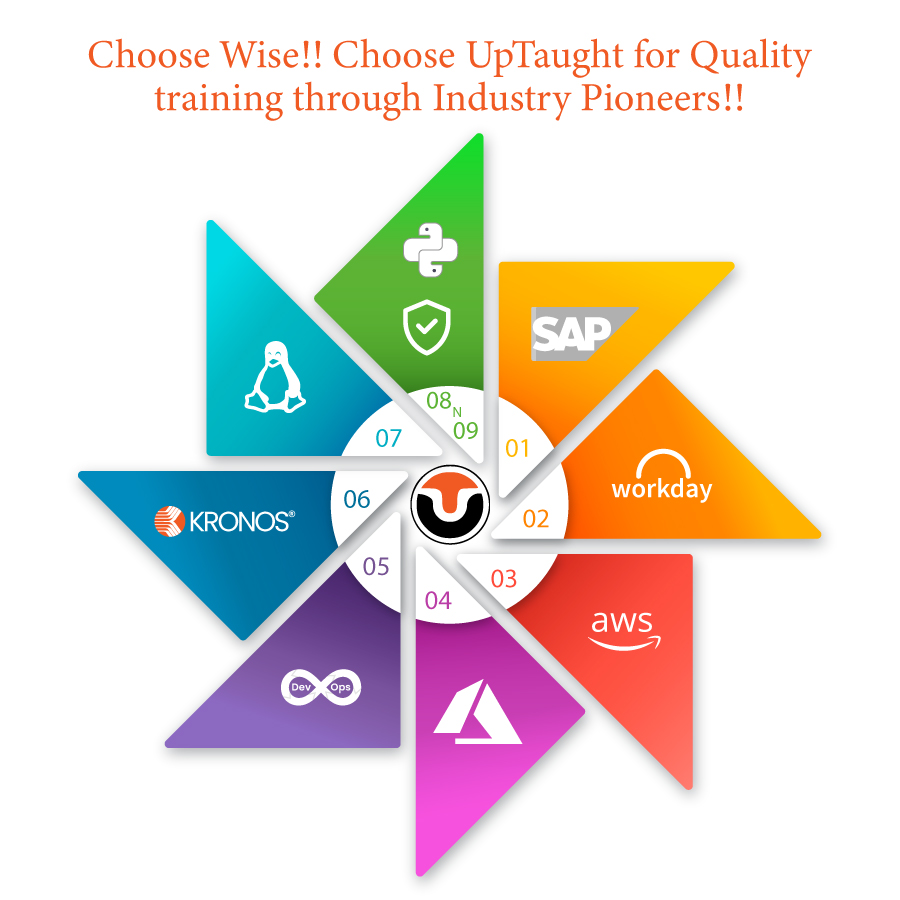Azure Solutions Architect Certification Training (AZ-303 and AZ-304)
Cloud Computing is the demand of today’s business. To understand the concept of the IT infrastructure, nothing stands best than training yourself in Microsoft Azure Solution Architect Course , training certification AZ – 303 & 304 by brought to you by UpTaught. Solutions are to be solved and thus we bring you interactive live sessions and labs recommended by the world’s industrial experts. Prove your Azure Architect Technology skills to the world. Complete your course without any delay!
-
LevelAll Levels
Start Date
Time
Duration
Type
Mode of Training
Course Curriculum
Module 1 – Introduction to Microsoft Azure
-
1. Introduction to cloud computing
-
2. What is Microsoft Azure?
-
3. Microsoft Azure Services
-
4. Azure Portal
-
5. Azure CLI
-
6. Azure PowerShell
Module 2 – Introduction to ARM & Azure Storage
-
1. Azure Resources & Subscriptions
-
2. Azure Resource Manager
-
3. Managing Azure Resources
-
4. Azure Tags
-
5. Azure Storage Account & its types
-
6. Azure Blob Storage
-
7. Azure Content Delivery Network (CDN)
-
8. Azure Files Storage
-
9. Azure File Sync
Module 3 – Introduction to Azure storage
-
1. Azure Table Storage
-
2. Azure Queue Storage
-
3. Azure Storage Explorer
-
4. Azure Shared Access Signature (SAS)
-
5. Azure Databox
-
6. Azure Storage Replication
-
7. Data Replication Options
-
8. Azure Import/Export Service
Module 4 – Azure Virtual Machines
-
1. Azure Virtual Machines
-
2. Data Disks in Azure
-
3. Azure VMs & Interfaces
-
4. ARM templates
-
5. VHD templates
-
6. Custom Images of Azure VM
-
7. Virtual Machine Scale Sets
-
8. Virtual Machine Availability Sets
Module 5 – Azure App and Container Services
-
1. App Service Web App for Containers
-
2. App Service plan
-
3. Networking for an App Service
-
4. Deployment slots
-
5. Container image
-
6. Azure Kubernetes Service
-
7. Azure Container Registry
Module 6 – Azure Networking
-
1. Azure Virtual Networks
-
2. Azure Vnet Components
-
3. IP Address – Public & Private IPs
-
4. Azure Vnet Subnets
-
5. Azure Network Interface Cards (NIC)
-
6. Network Security Group (NSG)
-
7. Route Tables
-
8. Service Tags
-
9. Azure DNS
-
10. Private DNS
Module 7 – Azure Networking – II
-
1. Application Gateway
-
2. Azure Front Door Service
-
3. Azure Traffic Manager
-
4. Application Security Groups
-
5. Azure Load Balancers
-
6. Azure Firewall
-
7. Azure Bastion
-
8. Network Watcher
-
9. Azure Express Route
-
10. Express Route Circuits
-
11. Express Route Peering
Module 8 – Authentication and Authorization in Azure utilizing RBAC
-
1. Identity and Access Management in Azure
-
2. Role Based Access Management (RBAC)
-
3. Role Definitions
-
4. Role Assignment in Azure Resources
-
5. Azure Users & Groups
-
6. RBAC Policies
Module 9 – Microsoft Azure Active Directory
-
1. Azure Active Directory (Azure AD)
-
2. Windows AD Vs Azure AD
-
3. Azure AD Users
-
4. Azure AD Groups
-
5. Azure AD Domains
-
6. Azure AD Tenants
-
7. Authentication Options
-
8. Azure AD Connect
-
9. Self Service password Reset (SSPR)
-
10. Multi Factor Authentication (MFA)
-
11. Resource Locks
Module 10 – E– Azure Monitoring
-
1. Azure Monitor
-
2. Azure Metrics
-
3. Log Analytics
-
4. Alerts and actions
-
5. Application Insights
-
6. Backup reports
-
7. Recovery Services Vault
-
8. Backing Up Azure Virtual Machines
-
9. VM Backup Policies
-
10. Restoring Azure Virtual machines
Module 11 – Multi Factor Authentication (MFA)
-
6. Azure AD Managed Identities
-
7. Azure AD Application Management
-
1. MFA Fraud Alerts
-
2. MFA Bypass Options
-
3. MFA Trusted IPs
-
4. MFA Verification Methods
-
5. Azure Key Vault
Module 12 – Migration in Azure
-
1. Understanding VM migration
-
2. Azure Migrate
-
3. Azure Site recovery
-
4. Server Assessment
-
5. Server Migration
Module 13 – Azure Data Platform – I
-
1. NoSQL and NoSQL Database
-
2. Cosmos DB
-
3. Multiple APIs and Data Models
-
4. Request Units
-
5. Request Unit Calculator
-
6. Accomplishing Elastic Scale
-
7. Partition Key
-
8. Cross-partition Queries
-
9. Replication
-
10. Turnkey GlobalDistribution
-
11. Turnkey Global Distribution
-
12. Replication and Consistency
-
13. Consistency Levels
-
14. Document Database
-
15. Cosmos DB Resource Model
-
16. Resource Properties, Self-links, and URLs
Module 14 – Azure Data Platform – II
-
1. Data Migration Tool
-
2. Rich Query with SQL
-
3. SQL Operators and Functions
-
4. Client Development
-
5. Indexing Policies
-
6. Users, Permissions, and Resource Tokens
-
7. Server-side Programming Model
-
8. Triggers
-
9. User-defined Functions (UDFs)
-
10. Table API
-
11. Cosmos DB Graph Database
-
12. Vertices and Edges
-
13. Populating the Graph
-
14. Bi-directional Relationships
-
15. Writing Gremlin Queries
-
16. Azure Table Storage
Module 15 – Azure App Service – Logic Apps
-
1. Introduction of Logic Apps
-
2. Generating Simple Logic App
-
3. Logic App With for Each & Filter Steps
Module 16 – Azure App Service – Web Apps
-
1. Service Bus Introduction
-
2. Understanding Service Bus Queue
-
3. Topics and Subscription
Module 17 – Event Grid
-
1. Event Grid Introduction
-
2. Event Grid Demo
-
3. Comparing Azure Messaging Services
Module 18 – Event Hub
-
1. Event Hub Introduction
Module 19 – Microservices and Kubernetes
-
1. Introduction to Microservices
-
2. Introduction to Kubernetes
-
3. Kubernetes Walkthrough
Azure Solutions Architect Certification Training (AZ-303 and AZ-304)
-
LevelAll Levels

Roadmap
Salary range
FAQs
Comparing AZ-303 and AZ-304 is like comparing Implementation and Design. AZ-304 entirely focuses on designing any application, and AZ-303 focuses on executing the design framed by the AZ-304 certified executives.
It is not difficult if you follow a better learning path and become easy to clear the Azure Solutions Architect certification. Before starting the preparation, focus on the Exam Objectives, check for good preparation resources.
Both AZ-303 and AZ-304 exams have their value in the industry. However, getting certified with any of these exams will raise your level of experience in cloud computing. Most importantly, when deciding which certification to go with, consider your experience, skills, and long-term professional goals.
The average salary for Azure skills is $96,000 as per compensation data firm PayScale.
Here are some of the jobs you could expect to get after passing the Azure Fundamentals certification exam.
- Azure Cloud Solutions Architect
- Azure Architect
- Digital Cloud Solutions Architect
- Senior Azure Architect
- Solution Architect
The certification exam costs $165 USD.
Microsoft is the second-biggest cloud provider in the market. It was launched in 2012 and has been emerging at an unprecedented rate since then. According to a study by Forbes, Microsoft Azure revenue developed 50% year-over-year in fiscal Q2, 2021. Cloud technology has taken the IT world by storm. More than 70% of the IT companies utilize the Cloud in one form or another, and this is going to enhance in the upcoming years. Hence, there is going to be a crucial shortage for Cloud professionals in the coming years. So gear up, and be ready!
You are allowed to take Azure cloud certification exam only for 5 times in a year. After exceeding the limit of 5 attempts, you can retake only after the completion of 12 months from the date of exhaustion of 5th attempt.
Microsoft certifications are structured into four levels:
- Fundamentals
- Associate
- Expert
- Specialty
This is because once you’ve proven that you comprehend the ins and outs of Azure services in the AZ-303, the AZ-304 exam assists you solidify your conceptual knowledge of building Azure solutions.
Microsoft certification exams are scored out of 1000. You need a 700 or higher to pass the AZ-303 exam and enhance your Azure Expert Badge.
The AZ-303 and AZ-304 exams will typically require to be renewed every 18 months. Microsoft will retire the certifications from time to time however, you may also identify exam numbers grow over time (this is what happened with the previous exam numbers now becoming 303/304) when Microsoft modifies the curriculum substantially for the certification.
The AZ-303 exam is a very complex exam! You can expect various types of questions like multiple choice, scenario-based, labs etc. Make double sure to get hands on experience by following along with the demos and trying things out for yourself in your own lab.
As per ZipRecruiter, The average salary of Azure Solutions Architects in the U.S. is at $152,142.
The following are the skills required to become a Solution Architect:
- Technical literacy
- Analytical assessment
- Managing schedule
- Leading the team
- Communication skills
- Solving problems




